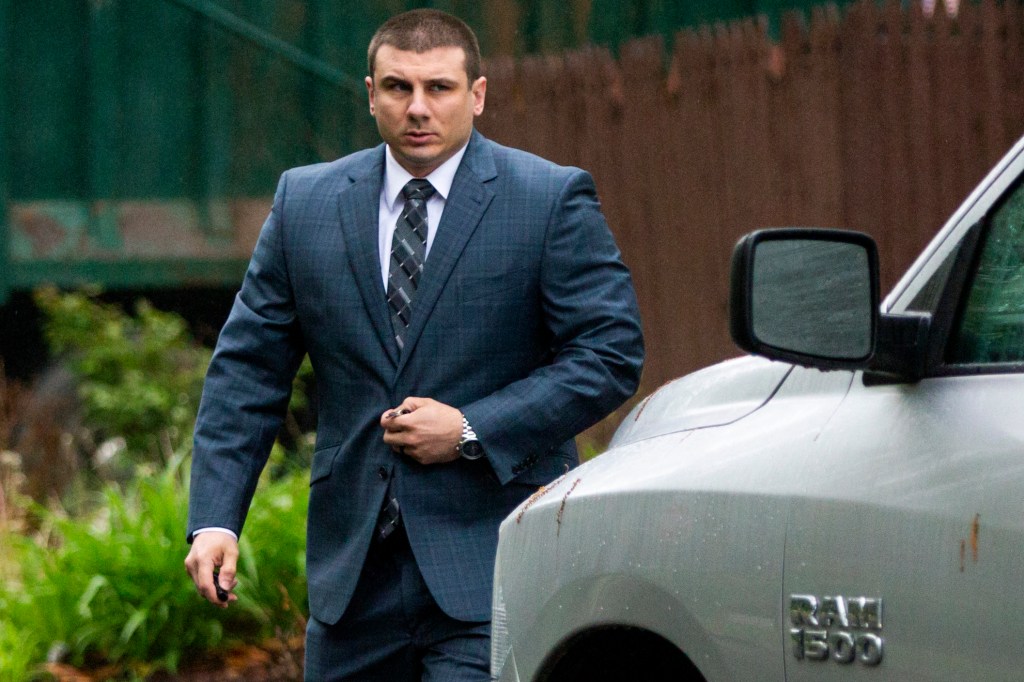In a case that begs comparisons to that of Michael Brown in Ferguson, a Staten Island grand jury on Wednesday decided not to indict the NYPD officer whose choke hold caused the death of Eric Garner, a 43-year-old father of six, in July. The grand jury was convened in September and has been weighing evidence that included a video of Garner’s last moments that went viral over the summer.
To indict, at least 12 of the 23 jurors were required to reach the relatively low threshold of “probable cause” that a crime had been committed. Instead, according to the New York Daily News, “a majority on the panel, which sources said consisted of 15 white and 8 black or Hispanic jurors,” concluded evidence of manslaughter or criminally negligent homicide was insufficient. Daniel Pantaleo, the officer who administered the choke hold, is white; Eric Garner was black.
Videos by VICE
Video of Garner’s death, which sparked outrage across the country, shows NYPD Officer Daniel Pantaleo questioning an incensed Garner for allegedly selling “loosie” cigarettes. Moments later, Garner gets taken down in a choke hold, a restraint tactic that has been banned by the department for decades. In one of the most disturbing moments of the video, Garner pleads with officers, uttering the phrase “I can’t breathe” at least eight times before he goes limp. Paramedics arrived seven minutes later but could not resuscitate the man. His death certificate was issued that day.
The medical examiner’s office ruled Garner’s death a homicide, noting that “compression of neck (choke hold), compression of chest, and prone positioning during physical restraint by police” caused his demise. But as Jonathan Blitzer wrote for the New Yorker earlier Wednesday—and as was driven home by the non-indictment of Darren Wilson in Ferguson—”prosecutors have notoriously wide latitude in terms of what they choose to present to a grand jury.”
Garner’s family plans to file a wrongful-death suit against the city, and federal civil rights violation charges are still possible. The NYPD is also still conducting its own internal probe. Protests against the non-indictment are planned for this evening and tomorrow in both Staten Island and Manhattan.
Update 4:00 PM: Mayor Bill de Blasio responds
The mayor put out a statement after the grand jury decision was announced, quoting Martin Luther King Jr. and calling his police commissioner a “strong, proven change agent.” We’ll see how New Yorkers feel about that soon enough. Full statement here.
6:30 PM: De Blasio issues speech, federal probe coming
Mayor de Blasio delivered a speech in Staten Island where he reflected on the danger his own biracial son faces and embraced some of the rhetoric of protesters. He and President Obama—who made remarks of his own Wednesday afternoon—also teased an investigation by the US Department of Justice, which Attorney General Eric Holder is expected to announce Wednesday night (and some outlets are reporting is already underway).
Some early highlights from de Blasio’s speech:
“Anyone who believes in the values of this country should feel called to action right now.”
“Black lives matter…it’s a phrase that never should have to be said. But it does have to be said.”
“This is now a national moment of grief and pain. We are dealing with centuries of racism that brought us to this place.”
And from Obama’s:
Some of you may have heard there was a decision that came out today by a grand jury not to indict police officers who had interacted with the an individual named Eric garner in New York City, all of which was caught on videotape and speaks to the larger issues that we’ve been talking about now for the last week the last month but last year and sadly for decades. And that is the concern on the part of too many minority communities that law enforcement is not working with them and dealing with them in a fair way.
In the wake of Ferguson we initiated a task force whose job it is to come back to me with a specific recommendations about how we strengthen the relationship between law enforcement and communities of color and minority communities that feel that bias is taking place…We are not going to let up until we see a strengthening of the trust and a strengthening of the accountability that exists between our communities and our law enforcement, and I say that as somebody who believes that law enforcement has an incredibly difficult job.
Follow Kristen Gwynne on Twitter.



